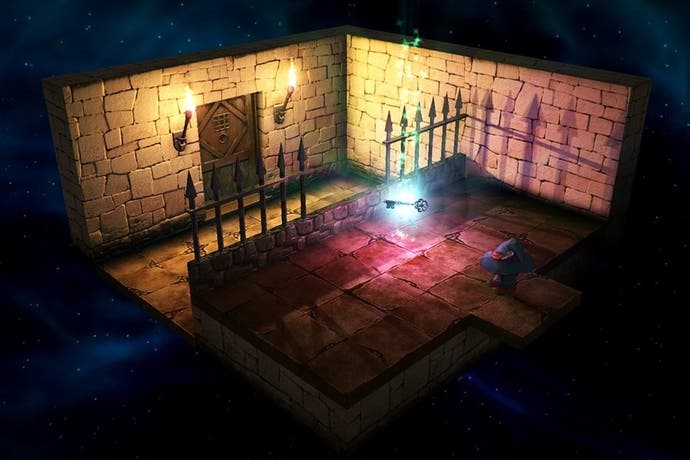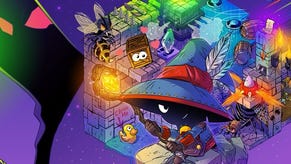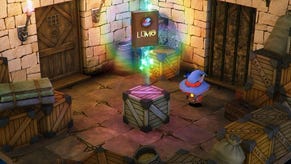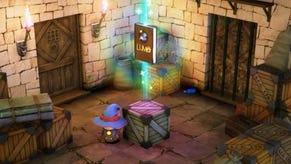Lumo, a new game from Ruffian's co-founder, is truly enchanting
How one man's journey from Crackdown 2 to bedroom coder is helping forge an indie gem.
"I needed something to make the water look more evil," Gareth Noyce says as he talks through what constitutes work for him right now. "Then I forgot to take the collision off, and I was jumping off the water and noticed I bounced right off of it - and I thought 'hello!'"
Noyce's first game as an independent, Lumo, is full of happy accidents like this, a chance occurrence that ended up as a full-blown mechanic which gently nods towards the classic Bubble Bobble. It's a game hazily woven together from various influences: the isometric adventures of Jon Ritman loom large, and it's easy to see the spirit of Head Over Heels in the chunky charismatic art.
Lumo's a game conceived through a happy accident, too. Noyce, who had not long left Crackdown 2 developer Ruffian - a company he helped found - was having a drunken Twitter conversation with prolific developer Ste Pickford, who pointed him towards speed-runs of the SNES action-puzzler Equinox and suggested he should have a go at making his own take on a genre that's been neglected over time.
"I woke up the next morning and thought sod it, let's have a go. So I knocked up a really quick prototype in two or three days - it's up on my YouTube channel and it looks awful. But it started to feel okay straight away," says Noyce, before delving a little deeper into some of his inspirations. "Head over Heels was the first game I ever played, and I spent a summer as a kid designing a bunch of rooms for it. It took me back to all that stuff. Me and a friend used to play it constantly - religiously - and it was one of the things that got me interested in doing development."
Noyce's own path to independent development has been an illustrious one, commencing at Climax before a lengthy stint at Microsoft ended up with him helping found Ruffian. "We had a good few years and I got to work with a bunch of really good studios," he says of working with teams like Bizarre and Lionhead in their prime when the were producing hits like Fable 2 and Project Gotham Racing 3. "It was good timing, and with the Xbox 360 in general - those were good games."
It was enough for Microsoft to entrust Noyce and a small team with the keys to one of its newer franchises. "We knew, tangentially, that Crackdown 2, wasn't getting picked up. So we started pitching it - it was lots and lots of conversations with Microsoft, until they were like yeah, you've done a lot of good stuff for us and we trust in you, and that was the start."
Crackdown 2's development was famously swift, the game releasing just over a year and a half after Ruffian first opened its doors. "When we started pitching the game, we pitched a full sequel with a new city," says Noyce. "But I think everyone circled around the fact that it was a big risk if we're setting up a studio as well. There was a phase where it was going to be a digital on-demand game, and then it kind of swapped out after pre-production to be a boxed product. The deadline was what it was, and we had about a year to plan."
The result was a game that launched to mixed reviews - many appreciated the fun at the core of the experience, while others lamented its inevitable similarity to its predecessor. It's a problem that perhaps might have been side-stepped, if things had worked out a little differently. "We didn't expect we'd be able to touch every building in the game, and we ended up doing that, so technically we might have been able to do something more with a specific city if we'd known at the start," says Noyce. "But I'm intensely proud of what we managed to do in that time - it was tough work. I know the reception wasn't as good as it could've been, and I can understand from the player's point of view why people thought that. The multiplayer, the four player co-op, that was the thing we wanted to get right. A lot of the positive reviews understood that."
Following Crackdown 2's release, Ruffian's work has often been in the shadows - it helped with Nike+ Kinect Training as well as, reportedly, Xbox One launch title Ryse - while it's been dogged by speculation about a new instalment in the series it was founded upon. It's been confirmed that Ruffian isn't working on Crackdown 3 - even if the desire has always been at the studio to see it happen.
"When I was there, we would have loved to have done Crackdown 3," says Noyce. "Obviously I don't know the status of it now - that's Microsoft's IP, and it's up to them what they want to do. There were a bunch of ideas in the studio for it - new cities, ways to progress the storyline, ways to change the character. There was a plan for the next two or three games in the franchise. There's a willingness to do it, but it was Marmite - it was a mixed reception. Microsoft wants slam-dunk triple-A products, so I can see why they'd give it a pause for a while."
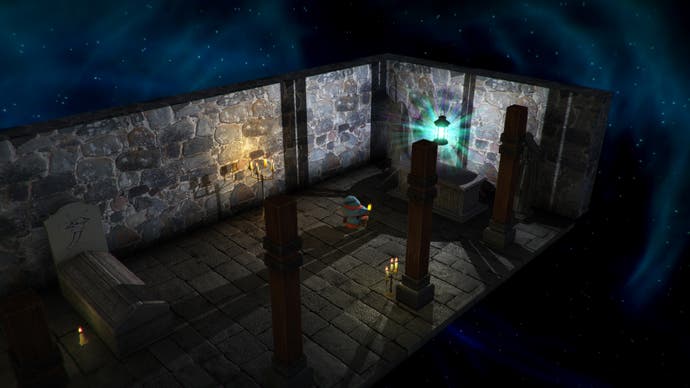
Noyce decided to go it alone late last year, and it's a decision that's worked out well, even if it has meant a dramatic shift in his approach. "If I was working for myself at Ruffian, I would have sacked myself by now," admits with candour. "I'm not working to any big plan, and there's no overarching desire. I've got a note of five or six mechanics I want to play for Lumo. Having that freedom, it's completely different. There's no pre-production, no big design doc and no-one telling me off for that shonky code I just put in. It's a different experience. If I have to pitch the game to someone, it makes it tricky - I don't know, I'm just making it up as I go along!"
It's the perfect environment, really, for a game that harks back to the golden age of bedroom coding, where classics like Head Over Heels were created by sole programmers messing around with software. "I'm literally sat next to my bedroom!" says Noyce. "It's a weird thing - that's the games industry I grew up wanting to be a part of, with people like Jeff Minter and obviously Jon Ritman making the isometric games. All of those guys, they're your kind of heroes. You'd see them in magazines and they're doing their thing, getting a game out every six months. There's a romance, and that's what attracted me to it. I think it's better than that now, because anyone can do it."
It's a new golden age, in fact, and a game as breezy, charming and smart as Lumo is a neat reminder that it's as good now as it's ever been. "I don't know how long this phase can last - the games industry seems quite cyclical - but the barriers to entry are lower than they've ever been," says Noyce with the benefit of experience. "You've even got the platform holders now saying hey, come and do your stuff with us. You'd have been dreaming of that six, seven years ago - it would have been impossible to think you'd be able to spend six or seven months and get something on Vita or PS4 without a household name."
Lumo might be one of those indies that makes it across, in fact, and although Noyce isn't currently looking at home consoles he's looking to the Vita for a future port, and potentially the Wii U too. If that doesn't work out, though, Noyce has already got other plans. "Realistically, if Lumo doesn't sell then I'm getting a job. I could be a postman, or something."
